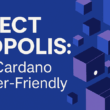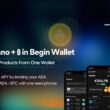The Alonzo hard fork combinator event is looking to occur over the last week of August and into the first week of September. The event will bring to market the long-awaited smart contract functionality of the Cardano blockchain.
Unsurprisingly, dApp development teams are in a full sprint as they work to get their products across the finish line. Liqwid Finance, a Cardano liquidity protocol, is no exception. The preeminent lending and borrowing platform is poised to become an early DeFi leader in the ecosystem.
Most recently, Liqwid Labs announced a collaboration with the SundaeSwap DEX. The partnership will see the protocols integrate token liquidity and oracle price feeds while furthering decentralized governance in the space.
Liqwid Tech
In 2020, decentralized finance (DeFi) protocols on Ethereum experienced an intense run-up in valuation. Termed “DeFi Summer,” the period ushered in the mainstream appeal of the smart contract class as well as a wave of capital. The TVL, or total asset value locked across the sector, began an upward trajectory from $3 billion in July 2020 to an all-time high of $154.91 billion. The trend was in part driven by the Aave and Compound platforms, among others.
Like these platforms, Liqwid is an algorithmic and non-custodial liquidity protocol for interest rate curves. The project aims to establish DeFi in Cardano’s eUTXO smart contract programming language Plutus. Having secured over $100,000 in Ada in Project Catalyst funding alone, Liqwid Finance is widely supported by the ecosystem.
adapulse.io previously covered the ins and outs of the Liqwid white paper. Briefly, the protocol functions by:
- Establishing open liquidity pools of assets
- Algorithmically calculating interest rates according to borrower demand and lender supply
- Allowing borrowers to lock collateral
- Incentivizing liquidity providers (lenders)
- Distributing incentives and automating liquidations
Overall, Cardano native asset holders who want to earn a yield stake their assets in the protocol’s liquidity pools. In so doing, they are awarded qTokens (deposit tokens) which represent their proportional claim to the underlying token plus yield (1:1 with the supplied amount). Liquidity pools generate yield from borrower interest repaid to the protocol and accrues to the exchange rate of qTokens to the underlying asset. Lenders can later withdraw their qTokens, including accrued interest, for a greater quantity of the underlying asset.
On the other end, borrowers (with sufficient collateral) are loaned assets from these liquidity pools with floating interest rates determined via an automated market maker (AMM) like mechanism common to DeFi. Borrowers post qTokens derived from one of their supplied assets as collateral to initiate the loan. A collateral factor, a ratio of required collateral unique to each supplied asset, determines the value a user may borrow from the protocol in another asset. Finally, Liqwid uses an automated collateral locking mechanism with a DEX like UI/X to streamline the liquidation process for third party liquidators securing the protocol from default risk and repaying the loans of borrowers who have surpassed their borrowing capacity.
In the future, Liqwid Finance will leverage Caradano’s Atala PRISM identity solution to provide identity-based lending solutions to users with the future goal of unlocking access to credit on the platform. The service will offer Liqwid users agency over their financial data and the ability to manage privacy, generate robust credit scores, and monetize this data. The feature is a truly exciting avenue of deployment that the Liqwid team is excited to build towards full-time. Upon deployment, Liqwid may likely be the first in the Cardano DeFi space to offer such a feature.
The SundaeSwap DEX Partnership
DeFi aficionados are familiar with the phrase “money legos.” Introduced in a 2019 Medium post by David Hoffman, the term describes how separate financial protocols interoperate to provide an ecosystem of diverse money services. Although the underlying accounting method varies from Cardano, the metaphor is currently up and running on the Ethereum blockchain.
However, Cardano’s “local state” accounting method likely forms a stronger foundation for a network of financial protocols. Recognizing this, Liqwid recently announced a collaborative effort with the SundaeSwap DEX.
According to a recent Medium post by Liqwid Labs:
“SundaeSwap will become Liqwid’s Cardano DEX of choice to integrate with at the time of the Alonzo hard fork, while Liqwid will provide additional liquidity to the DEX at the time of launch via the LQ governance token.”
The post continued:
“The SundaeSwap DEX has agreed to develop one of the first oracle solutions on the Cardano blockchain, allowing Liqwid to easily and securely initiate lending and borrowing markets for Cardano native assets in supported liquidity pools.”
Naturally, oracle solutions are an essential part of the equation for a lending and borrowing platform. Oracles provide secure price feeds for assets. Borrowing rates, collateral ratios, and other aspects of Liqwid will rely on this information to provide smooth function across markets.
Finally, the partnership will implement Liqwid’s audited system for community governance across The SundaeSwap DEX. The module will support a well-tested voting mechanism to allow community members to determine the direction of protocol development moving forward.
Establishing Norms
Reading between the lines, SundaeSwap’s decision to incorporate the Liqwid governance model is easy to understand.
The Liqwid DAO governance system is being implemented in partnership with Plutus Partner MLabs. The LQ token sits at the heart of Liqwid governance processes, and the future direction of the Liqwid protocol will be decided by voting on proposals using LQ tokens as the voting mechanism. The token has a hard-cap of 21 million coins which has already been minted and will begin distribution to early protocol users through a Plutus vesting contract upon Liqwid v1 launch on the Goguen mainnet at some time in September.
LQ tokens will be distributed among:
- The community, 60 percent
- The core team, 24 percent over two years
- Yield farmers, 10 percent
- The DAO treasury, 5 percent
- Advisors, 1 percent over two years
Distribution follows the protocol’s DAO first and fair token launch philosophy. Liqwid founder Dewayne Cameron explained on the Cardano Live podcast the importance of getting governance right:
“Everyone has the ability to provide liquidity and earn LQ at the same time, including our core team. We are on a vesting schedule that lasts two years alongside the user distribution system. There are no early insider investors. Even our core team is waiting for the protocol to launch on Plutus before we get access to these LQ tokens.”
Cameron hopes the model will become standard throughout the space. Moreover, Liqwid eschewed typical corporate structures upon launching in favor of its community-led DAO approach. LQ holders will also direct funds held by the DAO’s treasury towards future protocol upgrades. To learn more about the Liqwid DAO check out their medium article.
For more information, please visit the Liqwid Finance homepage.










